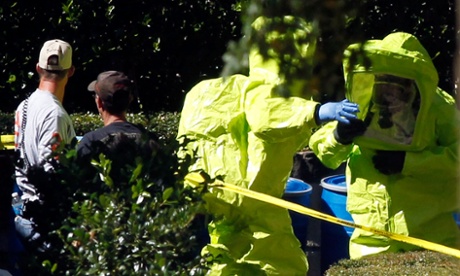Seventy-five staff members of Dallas hospital asked to sign ‘binding legal order’ that states they will avoid public spaces

Healthcare workers deemed to be at risk of contracting Ebola after dealing with a patient who died from the virus in Texas are being asked to sign voluntary agreements to stay away from the public, after Dallas authorities decided against declaring a state of emergency.
Seventy-five staff members from Texas Health Presbyterian hospital are being given a “binding legal document and order” that states they will avoid public transport, not go to areas where large numbers of people congregate, and continue to be monitored twice a day for symptoms, county judge Clay Jenkins said on Thursday.
Any of those involved in the care of Thomas Eric Duncan who refuse to sign the agreement would be subject to a legal control order, Jenkins told reporters after a meeting of the county commissioners court in downtown Dallas. “All the remedies of the law are available,” he said. However he said he believed this would not be necessary. “These are hometown healthcare heroes,” he said. “They’re not going to jail.”
It was unclear how long the agreements would be in force. After first suggesting that all 75 healthcare workers had approved them, Jenkins conceded that the wording had only just been finalised, and that some of the 75 may have learned of it from watching broadcasts of the commissioners meeting. “This is clearly not the way I wanted it to go,” he said.
The healthcare workers will also have their home addresses flagged on the internal systems of emergency services, said Jenkins, adding that this would prompt first responders responding to calls from their houses to raise an alarm. The flags would disappear when they are no longer at risk of Ebola.
The new measure was implemented amid sharp criticism over Amber Vinson, the second nurse to be diagnosed with Ebola after treating Duncan, being permitted to take commercial flights between Texas and Ohio despite already experiencing a fever. Vinson, 29, has been transferred to a facility in Maryland for treatment. Nina Pham, the first nurse to be diagnosed, is being treated in Atlanta.
In all, more than 135 people – including the 75 healthcare workers, 48 other people who had contact with Duncan before he entered hospital, and a number of people Vinson encountered in Ohio – are being monitored for signs of Ebola.
Jenkins announced the voluntary agreements after surprising the audience for the commissioners meeting by saying that he would not be declaring a state of emergency because of Ebola. A proposal for him to declare such an emergency was the sole stated reason for convening Thursday’s emergency meeting.
The proposal, published in advance awaiting Jenkins’s signature, called for “extraordinary measures” necessary because Dallas “has the potential to suffer widespread or severe damage, injury, loss or threat of life resulting from the Ebola virus.” However, the motion was abruptly ignored and Jenkins announced the meeting had become “a public discussion”.
“At this point we don’t feel that it’s necessary to take extraordinary powers, because we were able to do everything through our partnership with the city of Dallas, the state of Texas and the federal government,” Jenkins said afterwards.
Jenkins, who as county judge is the highest-ranking elected official in Dallas county, indicated that the decision had been taken following consultations with other officials including Rick Perry, the Republican governor of Texas, who returned from a visit to Europe to help deal with the situation.
Referring to the wide-ranging powers that he would have been handed to control the movement of people into, out of and within the county, and to evacuate Dallas if necessary, Jenkins said: “That’s not what America is about. I don’t want those powers vested in me, and neither does Governor Perry.”
Jenkins chided the operators of the hospital for failing to prevent infections among its staff. He said he would begin working from inside the hospital in a unified command structure alongside Centers for Disease Control and Prevention (CDC) officials.
“The buck has to stop with somebody, so the buck will stop with me,” said Jenkins, amid ongoing complaints that no one figure has emerged to lead Dallas’ response to the virus.
Zachary Thompson, the county’s health director, told the meeting that the voluntary agreements with the healthcare workers must “give the cities a comfort level that the 75 are contained”, adding: “We need to be clear and transparent to the public that we don’t hear a new number”.
Two of the four county commissioners signalled to the Guardian just hours before the meeting that they were in favour of the emergency declaration, which they said would also have made it easier for the county to obtain state and federal funding for its response to the crisis.
“This is still evolving and the only way we can get reimbursed as a county is to make this declaration,” said John Wiley Price, the commissioner for district three, who promptly backtracked once the meeting had begun following delays while the commissioners held discussions backstage.
“I think it’s important that we be reimbursed but that can’t be my focus right now,” said Jenkins. “Public safety has to be priority number one”.
District four commissioner Dr Elba Garcia, whose chief of staff said before the meeting that she, too, wanted a state of emergency declared, said from the stage: “At this point I agree with Commissioner Price that the emergency declaration is a tool in the toolbox. I’m going to be very honest with you: I was ready to vote for it. But I think we should put it back in the toolbox.”
Both Dr Theresa Daniel and Mike Cantrell, the other two county commissioners, along with Mike Rawlings, the mayor of Dallas, said from the stage that they agreed with the decision not to declare an emergency. Asked afterwards why the emergency meeting had been convened at all, Jenkins told reporters: “You’ll have to ask the commissioners.”
